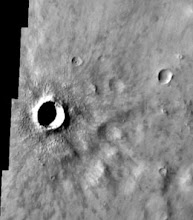Last night, sometime after two in the morning and before seven, it snowed. Everything is very pretty and bright outside, even though the trails are covered with footprints and there's not even enough snow to cover the grass. When I was (significantly) younger I read a poem that's stuck with me--or at least the last line has. The poem itself is somewhere below mediocre, and apparently from a greeting card collection or an anthology of Christmas card poetry? I'm not quite sure. (I found a reference and the full text here).
"Despite the forecast's promise,
It didn't snow that night;
But in the morning, flakes began
To glade all right.
Not enough to cover roads
Or even hide the grass;
But enough to change the light."
Say what you will (and I have plenty to say) about the use of "glade," but I just can't forget the very last line. But enough to change the light. That's what snow does: reflects light around, even when it's clouded over, until everything seems different--lighter, brighter, fresh, new. Even if there's only a little tiny bit of it.
The other thing I love about snow is the smell of it. On very cold nights, or when you go outside first thing in the morning after it's snowed, you can smell: bright and cold. Sometimes when it doesn't snow, and it's just cold outside, you can smell it, too. I guess it's my version of the smell of rain, which I don't have strong associations to: I'm from the Pacific Northwest, and we don't get torrential downpours. We get drizzle, and either the smell's not there or it's so prevalent that I don't even notice it. I think it's the former.
Either way, I didn't smell rain until a chemistry lab this fall: we were taking a spectrographic reading of ozone, which required making ozone and then bottling it. The teacher let us smell it: the smell of rain. Free oxygen radicals created by high energy breaking apart a stable O=O (O2) molecule into its components, and then the unstable free radicals joining a whole O2 molecule to create ozone, O3. The smell of rain is ozone, and it seemed incongruous in a classroom full of students trying to get spectrometers to analyze light absorbtion or whatever else. It was a little bit surreal.
Monday, December 7, 2009
Subscribe to:
Post Comments (Atom)




No comments:
Post a Comment